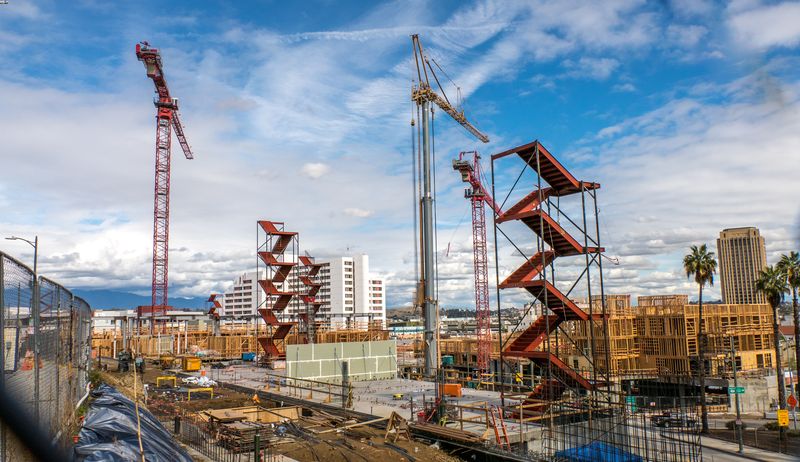California Bid Bonds
What is a Bid Bond?
Bid bonds are a type of construction bond that protects the owner of a project or general contractor during the construction bidding process. What the bid bond guarantees is that you, as the bidder, will compensate the project owner if you fail to enter into the contract and provide any required performance and payment bonds.
A bid bond usually involves three entities: the obligee, the surety, and the principal. The obligee is the owner or general contractor of a construction project, the principal is the contractor, and the surety is the bond company that issues the bid bond to the contractor.
Who Requires a Bid Bond?
In the state of California, all public construction projects require this bond when you submit your bid. This is true for federal construction projects as well. The coverage value is called the penal sum and means the maximum amount of damages the surety will cover to the owner or general contractor of the construction project. It is usually required for 10% of the bid amount but it can vary. Federal projects, for example, typically require the bond to be 20% of the bid amount. It’s important to check the particular project and owner requirements. Bid bonds can be the key to a contractor getting an opportunity to pursue a project, and they ultimately protect the project owner by discouraging contractors from submitting inappropriately low bids to win a contract.
If you have any questions about our California bid bond services or wish to partner with CSBA for your contractor bond needs, we invite you to contact us.
How to Apply for a Bid Bond
Applying for a bid bond is not too different than applying for a loan. Bond companies need to determine if you have both the experience and financial capability to complete the construction project. How a bond company determines that depends on the size of the bond you need, but revolves around the following points:
- What is your credit score?
- How long has your construction company been in business?
- Do you have the financial resources to complete the work?
- What is your track record of profitable projects completed?
- Do you have the labor and equipment to complete the job you’re seeking a bond for?
At CSBA, we differ from other agencies, because we have internal underwriters that guide you through this process step-by-step. We take the time to understand your unique situation and goals, which enables us to obtain the bonds you need quickly, so you can pursue the projects you are seeking.
How Much Does a Bid Bond Cost in California?
A bid surety bond in California is not typically charged for. When you are a low bidder on a project and awarded the contract,the surety bid bond provider then issues a performance or payment bond, which is where they’ll charge a premium. It’s important to know the premium rate you’ll be charged for the performance and payment bonds, so you can include that cost in your bid.
What Having a Bid Bond Means
What the bid bond definition often doesn’t state is what it means to have one. When a surety agency issues a bid bond, it says to the owner of a project that a proposed contractor is financially stable and has the correct resources to handle the construction project. Since all public construction projects require bid surety bonds, they are the key that allows you to open the door to bidding work and can be vital to building your business.
Does it Matter Where I Get Bonded?
An Insurance Agent
An insurance agent can potentially issue a bond to a contractor and would require all the same documentation and information described earlier. What the insurance agent lacks is the professional experience that makes for a smooth bonding process, nor do they have the industry connections with surety providers, which is key to getting the surety bid bonds required for the growth of your company.
A Surety Specialist
A surety agent, or specialist, has dedicated their professional life to surety bonds and helping CA contractors get bonded. Due to this exclusivity in their career, they have formed beneficial relationships with surety companies and know the road ahead in bonding. Beyond their experience and relationships, many surety agents have access to special programs others don’t, and they can provide guidance in how to structure the financial side of your business to help with bonding capacity for larger jobs down the road.
CSBA is just that, a surety specialist. We have been helping contractors with bid bonds since 1984, and our team has over 225 years of combined surety experience to guide you through the bonding process.
Bid Surety Bonds FAQ
What is the difference between a bid bond and a performance bond?
- Bid bonds are required when contractors bid a project and guarantees if they are low bidder, they will enter into the contract and provide any required performance and payment bonds. Performance bonds guarantee the actual performance of the work to be completed by the contractor according to the terms of the agreement. What happens to a bid bond after a contract is signed?
- The bid bond is replaced by a performance bond if the bid is accepted and the contractor enters into a contract with the owner or general contractor.
How long are bid bonds good for?
The length of time that bid bonds are valid is determined by the particular project owner you are bidding to. Some owners state the requirement in the specifications while others are silent. Many project owners require the bid bond to be good for 90 to 120 days after the bid, and some will ask for extensions when the project award takes longer than that time.
Get a bid bond quote now
We want to know more about how we can help your construction company get the right contractor bond for your next project. Fill out the form and one of our local expert bonding agents will be in touch with you shortly.
"*" indicates required fields
Bid Surety Bonds Articles
Every once in a while, a project owner or general contractor will take a long time to award a project. If the project award drags…
Construction bid bonds are very rarely called. In fact, in our agency’s history, we’ve only seen three bid bond claims. When you consider we issue…
When contractors submit a bid bond request to their surety company, it is often early on in the bid process, and you may not have…



